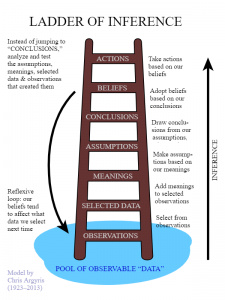Image courtesy: Mykl Roventine at https://www.flickr.com/photos/64419960@N00/4143699557
Emotional Intelligence (EQ) is key for one to be successful, especially so for leaders. A person with higher EQ will respond to a situation over reacting to it. To quote Viktor E Frankl, “Between stimulus and response there is a space. In that space is our power to choose our response. In our response lies our growth and our freedom.” In this blog I will talk about the Ladder of Inference which leverages one’s EQ and strengthens it.
Respond vs. React
One would have heard about counting till 10, if one is angry before they respond. Waiting for a while before you send off an angry email or a post. Ascertaining by asking questions the correct understanding of the situation, before one responds or acts.
As an Agile coach I focus on the person being able to respond over react. I use a plethora of approaches to coach them, starting with making them aware of situations observed, where there could have been alternate responses/outcomes. I encourage them to focus on data/facts over going by assumptions, stress on separating the people from their ideas/deeds. I leverage my experience and draw upon a few concepts from the Seven Habits by Steven Covey – Being Proactive, Begin with the end in mind. …
This goes hand in hand with making them aware of EQ and its components, as popularized by Daniel Goleman – Self-awareness, Self-Regulation, Self-Motivation, Empathy and Social Skills. Each person has to become aware of themselves and their emotions as well as be conscious of others and their emotions. It takes time and practice.
Then I came across the concept of Ladder of Inference, which I realized was something I was striving to do all along, without being aware of its existence. I thought that I should share this wonderful concept.
Filters?
Many of you would be are aware that when you do a google search the results you get are tailored to your profile and search history. You can take a look at this:
https://www.ted.com/talks/eli_pariser_beware_online_filter_bubbles?language=en
Each one of us, has our own world view and view the world through our filters, this can cause issues at times. You may be biased about a person being frivolous and disregard his ideas/ inputs unknowingly. One way to overcome this is by being self-aware, try be aware of others and practice the ladder of inference technique in your interactions.
Let’s look into the ladder of inference, it says that though the same pool of data and facts are available to all. We are selective about the observations we make. Based on our observations we interpret it where our personal and cultural bias can come in, make assumptions and reach a conclusion. That becomes our belief and then we act according to that. As we act according to our belief, it gets further reinforced.

Image courtesy: https://commons.wikimedia.org/wiki/File:Ladder_of_inference.svg, https://creativecommons.org/licenses/by-sa/4.0
Let’s take an example, Mayank, is the Scrum Master and he noticed that Vijay is late for the Retrospective. He happened to be late for the Planning meet too and was unable to complete one of the stories he had picked to work on. Mayank may conclude that Vijay is unprofessional and lacks skills, because he himself is punctual to a fault and will try his best to complete work that he picks up, come what may. In the Retrospective, Mayank may get two differing views on a point being discussed. One from Vijay and another from Mohan a team member who is punctual and usually able to complete the stories he picks up. It is possible that Vijay’s views were more relevant and Mayank ignores them.
The one way for Mayank to work out of this – as a Scrum Master, he looks at all inputs neutrally and when in doubt ascertain facts by asking more open ended questions. For example, he needs to introspect on his assumptions about why Vijay is late in attending sprint events and unable to meet his work commitments. He can probe further and be open to look at additional data which may change his assumptions and conclusions drawn from them.
It’s something that happens to most of us, so being aware of this will help us take more balanced and better decisions consistently.
Some related details:
1. The quote at the start attributed to Viktor Frankl, he is the author of the book Man’s Search for Meaning
2. The Ladder of Inference was conceived by organizational psychologist Chris Argyris and used by Peter Senge in The Fifth Discipline: The Art and Practice of the Learning Organization
3. Link to an article on Separating People from their Ideas and Actions.






2 Responses
Nice blog on Ladder of Inference, Vasu! I can see that you have made good use of it in many of your coaching conversations. Thanks for sharing!
Very informative Vasu. All human beings have this disease of bias isn’t it? So tough to be neutral and factual, but very much needed.